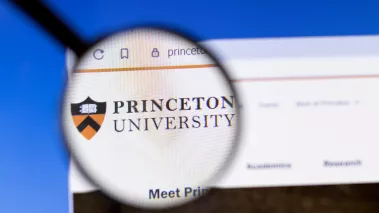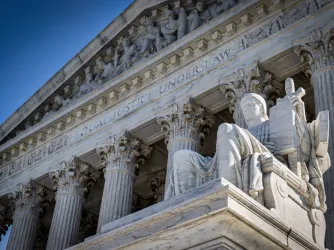Table of Contents
Princeton keeps letting students weaponize no-contact orders against student journalists

Postmodern Studio / Shutterstock.com
For at least the second time in two years, Princeton University is allowing the weaponization of no-contact orders to silence pro-Israel journalism on campus. Today, FIRE and the Anti-Defamation League wrote Princeton to express shared concern about the university’s continued improper use of no-contact orders, and similar “no-communication” orders, to censor student journalists.
The most recent incident arose on Nov. 9 when a journalist with The Princeton Tory, a conservative student publication, covered a campus protest held by Students for Justice in Palestine. While the journalist was recording footage of the protest, a graduate student allegedly attempted to block the journalist’s camera and then followed her around as she tried to cover the event. The journalist reported the incident to a public safety officer, but the officer blamed the journalist for “inciting something” and did not intervene. The graduate student allegedly continued to physically obstruct the journalist, eventually pushing her and stepping on her foot.
After the protest, and despite all indications the journalist had done nothing more than newsgathering in the ordinary course of covering a protest, the graduate student obtained a no-contact order against the journalist.
Although Princeton’s own policy for issuing no-contact orders requires a student to first communicate in writing with the other party that they wish to have no further communication, the university reportedly allowed the no-contact order to remain in place even after Princeton learned the graduate student had never communicated with the journalist.
This is not the first time FIRE has raised this issue with Princeton. In January 2023, FIRE wrote the university after an administrator issued a no-communication order — similar to a no-contact order — to another Princeton Tory journalist.
When the journalist asked the university whether she could still publish articles mentioning the graduate student by name that were written prior to the no-contact order, an assistant dean advised the journalist to “refrain from writing or to be interviewed for articles that mention the name of the student with whom you have an NCO (or to retract them if that’s possible).” Otherwise, noted the assistant dean, “it is possible some statements may be interpreted by the other student as an indirect or direct attempt to communicate” in violation of the no-contact order.
As we wrote in our joint letter to Princeton, this is deeply problematic for both free expression and free press on campus:
Princeton is allowing students with ideological disagreements to transform no-contact orders into cudgels to silence the “lively and fearless freedom of debate and deliberation” that Princeton promises all students. This is at least the second time in the last two years that a Tory student journalist has been silenced by a no-contact order at the behest of community members offended by his or her pro-Israel journalism. This systematic weaponization of no-contact orders to silence pro-Israel journalism — or any journalism — cannot stand.
This is not the first time FIRE has raised this issue with Princeton. In January 2023, FIRE wrote the university after an administrator issued a no-communication order — similar to a no-contact order — to another Princeton Tory journalist.
A student leader with the Princeton Committee on Palestine requested the order in response to the journalist’s coverage of the PCP’s Feb. 22, 2022, protest of the Center for Jewish Life’s Israel Summer Programs Fair. The journalist had communicated with the PCP leader only once — to confirm facts and quotes prior to publication of her article about the protest. In Princeton’s notice to the journalist, it explained that the order was issued pursuant to its Title IX sexual assault policy, which allowed any student to seek a no-contact or no-communication order “due to interpersonal conflicts.”
As the student journalist, Danielle Shapiro, later wrote in the The Wall Street Journal about the incident, the no-communication order — issued without any investigation by the university — effectively prevented her from reporting on PCP’s events and protests while it was in place because it prohibited her from performing the necessary due diligence of verifying facts with sources.
After Shapiro’s Wall Street Journal piece ran, Princeton modified its policy by moving the provision on no-contact orders to its “Conflict Resolution” procedures and requiring students to notify the other party with whom they wish to have no contact before requesting a no-contact order.
But, as FIRE warned Princeton last year, the changes “may worsen the situation rather than rectify it.” Allowing no-contact orders to issue against students “as a form of basic ‘conflict resolution’” enables students “to use university systems to ‘obstruct or otherwise interfere with the freedom of others to express views they reject or even loathe,’” in violation of the university’s Statement on Free Expression. Further, by omitting any requirement that a student first violate an informal request to have no communication, the policy “stifles students’ legitimate news gathering activities and violates their expressive rights.”
Those predictions have now come to pass as Princeton has once again allowed a student to weaponize university policy to silence journalism they dislike.
We hope this time Princeton will heed our warning.
FIRE defends the rights of students and faculty members — no matter their views — at public and private universities and colleges in the United States. If you are a student or a faculty member facing investigation or punishment for your speech, submit your case to FIRE today. If you’re faculty member at a public college or university, call the Faculty Legal Defense Fund 24-hour hotline at 254-500-FLDF (3533). If you’re a college journalist facing censorship or a media law question, call the Student Press Freedom Initiative 24-hour hotline at 717-734-SPFI (7734).
Recent Articles
Get the latest free speech news and analysis from FIRE.

The federal charges against Don Lemon raise serious concerns for press freedom

The American people fact-checked their government

California prohibits its teachers from talking about a student's gender identity to their parents. That raises First Amendment concerns.



